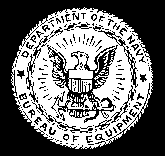 In the 1800s broadcasters adopted call signs to aid in signaling. This practice continued when ships began to use radio. [popularized by the sinking of the titanic] Initially brodcasters determined their own calls. This led to duplication and confusion.
In the 1800s broadcasters adopted call signs to aid in signaling. This practice continued when ships began to use radio. [popularized by the sinking of the titanic] Initially brodcasters determined their own calls. This led to duplication and confusion.In 1884 the first effort to standardize this occurred. The head of the Federal Bureau of Navigation, (FBN) Eugene T. Chamberlain, exorcised a new vaguely worded statute and assigned marine-radio call letters. His previous career as Ships on the Atlantic and gulf coasts were assigned calls beginning with K, and those on the Pacific coast and Great Lakes were assigned calls beginning with W. It is unknown why he chose K and W.
In 1906 Berlin International Wireless Telegraph Convention (BIWTC) declared that all ship and shore stations should have unique call signs consisting of three letters. The U.S. did not ratify the BIWT convention until 1912. (why are we always behind Europe?) That year Congress empowered the FBN to license land stations in addition to the marine stations. Official documents issued in 1913 confirmed the practice of assigning W calls to stations in the west and K calls to stations in the east.
The following year Congressimproved the system slightly deciding that the Pacific coast would get W for ships and K for land stations, the Atlantic and gulf coasts would get K for ships and W for land stations. This made it more simple to distinguish a marine broadcast from a land broadcast.
It was not until 1923 that the missisippi became the dividing line. Prior to that Texas as a gulf coast state had W's! The dividing line started at El Paso and worked its way east the then north.
see map: http://earlyradiohistory.us/kwbigmap.gif
There are many exceptions to the K&W rules even today. Below are some contemporary examples. These are all considered "heritage" call letters and they are highly valued.
KYW-AM 1060 Philadelphia, PA ...the K furthest to the east
WIL-AM 1430 St. Louis, MO
WOAI-AM 1200 San Antonio, TX ...the furthest W to the west.
WOI 90.1 Des Moines, IA
Exceptions along the border are commonplace as the calls are assigned by city of license and not the location of the transmitter. Minneapolis , Memphis, New Orleans and other markets straddle the line and each contain multiple exceptions. A simple explaination here:
http://www.dxing.com/callsign.htm
For all of his trouble-making, eventually the Navy named a ship after Mr. Chamberlain. It is a Liberty Model.




No comments:
Post a Comment